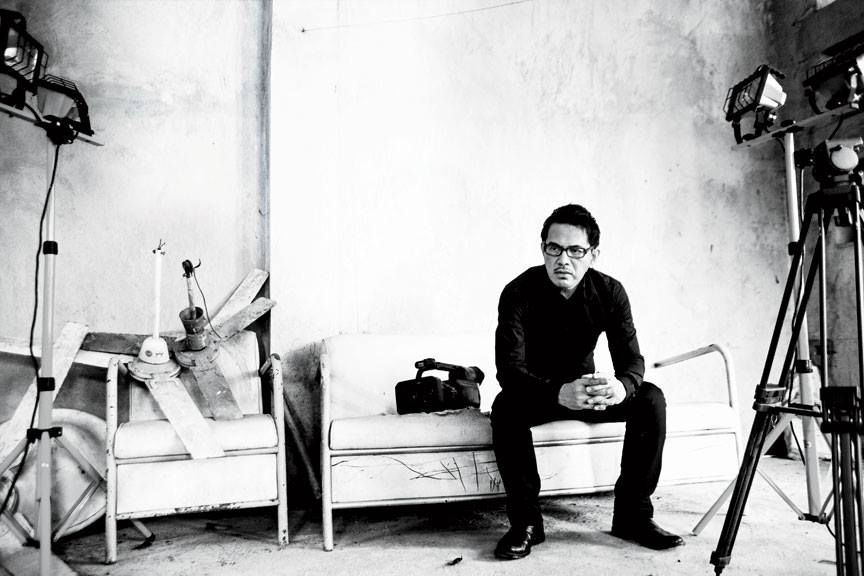This May, two sure-t0-be blockbuster superhero movies power through our cinemas, quickly bumping off the little known or heard of Sinag Maynila with a big “Kapow!” Sinag Maynila is an independent film festival that features prolific and up and coming directors and casts who use the medium to depict relevant national issues
How many cinema goers will be transfixed by in-your-face graphics and surround sound? How many of them will ever know, or appreciate, that independent films like those in Sinag — films they were never excited for — have Filipino talents making headlines at Toronto, Venice and, oh yes, Cannes?
Why is the Filipino more revered by audiences overseas? What is the audience here, back home, missing?
A brilliant mind offers some answers.
Text by DENISE ROCOÂ
Photography by PAUL MONDOK
The first thing I must tell you about ultra neo-realist director Brillante Mendoza is the last thing that caught my eye upon leaving his white-washed conference room. It is a glassless, black-framed handwritten letter in red ink, on an A4-sized hotel stationery from the InterContinental. An excerpt from the letter reads, “Your decision to never dramatize the murder, never indulge in movie suspense, was bold, daring, and to me, the whole point of making the movie in the first place… I believed everything I saw. Your point wasn’t to dramatize it. It was to culture it. Bravo.â€
The note was from American award-winning director Quentin Tarantino who was referring to Kinatay, a film Brillante released in 2009. Not only did it win him the Sitges Film Festival Award for Best Director, but also the Best Director at the Cannes Film Festival, which makes him the first Filipino to ever win such an award.
This University of Santo Tomas graduate of Advertising Arts comments about his 2013 release Sapi and the press bashers, “It’s not just to scare. I try to inject social issues most specifically in media, the network war about ratings. You can’t please everyone. Even in my first film (Masahista released in 2005), Chicago Sun-Times’ Roger Ebert called it the worst film in Cannes. After that, I’m no longer affected. It’s not that I don’t care. I just try not to be affected by those criticisms. I know my take on my film. As we speak it’s being shown in the Brisbane International Film Festival. It was shown in Toronto and Taiwan along with Ang Lee’s film. Masasaktan ka pa ba sa mga criticisms na ‘yan (Will I still get affected by criticisms like that)?â€
“I think to be an effective writer and filmmaker you have to be interested in people; if you’re not interested, you’ll be bored. Like now, I’m interested in a lot of human trafficking, in the environment, our culture, tradition, old practices, bums on the streets. You don’t have to be a celebrity or a rich person to have an interesting story. (If) it’s coming from true emotion, real experiences become universal,†he states.
Whether his parents were right in naming him Brillante or that Brillante decided to live up to his name is impertinent. The last news that his father Pastor Mendoza and his wife Gervacia Manguerra wanted to hear was that their youngest (in a brood of seven) was set to leave San Fernando City, Pampanga.
After all these years, one question can’t escape him. And the question is why Filipino directors in the alternative scene make many films – and good films at that – despite having no audience. The statistics are startling. “In the Philippines, out of the 100 million population, only 40 percent watch film. This 40 percent watch mainstream, of the 40 percent you have one percent that watch alternative. These are the cinephiles, the film students, but how many are the film students and the film schools, anyway? That is the audience. You can’t change the mindset of an audience overnight,†he elaborates.
The multi award-winning director also emphasizes that it is doubly hard when majority of Filipinos watch telenovelas easily accessed from TV at an early age, thus molding their idea of cinema. To create a higher form of aesthetics among viewers, Brilliante suggests that government, local municipalities, private sectors, theater owners and artists themselves should create a unified effort and unified audience. “This should start at an early age because you’re developing minds of the young to appreciate. If you grew up on telenovelas, naturally when you go out, that’s what you’ll look for. And what are Hollywood films but better made telenovelas? That’s because (we’re not exposed to other) kinds of cinema.â€
At one point, he wishes to just chat about his next project about underground boxing in the Philippines, which excites him very much. But I prod the question further, about how to solve the lack of audience. He responds, “The government, ever since, does not prioritize culture… so look at us, we have no identity. We’re not proud of our race, our culture, when in fact our culture is so rich. I can’t understand why people in the government don’t prioritize our culture (when) it’s our soul. ‘Di ba ang bansang walang kultura ay isang bansang walang kaluluwa (Is it not that a nation without culture is a nation without a soul)?â€
This leads one to ask why Brillante continues to go through the perpetual onerous task? “At the end of the day,†he answers with humility, “if there’s only one or two people watching your film, and if you touched the heart of even just one person, that makes a difference.â€
Editor’s note: The original article featuring these excerpts was first featured in PeopleAsia’s December 2012 – January 2013 issue. Brillante Mendoza was a PeopleAsia People of the Year awardee in 2013.Â







